| Srl | Item |
| 1 |
ID:
187207


|
|
|
| 2 |
ID:
128777


|
|
|
| 3 |
ID:
178219


|
|
|
|
|
| Publication |
New Delhi, MP-IDSA, 2021.
|
| Description |
75p.pbk
|
| Series |
MP-IDSA Monograph Series no.; 69
|
| Standard Number |
9789382169963
|
|
|
|
|
|
|
|
|
|
|
|
Copies: C:2/I:0,R:0,Q:0
Circulation
| Accession# | Call# | Current Location | Status | Policy | Location |
| 060001 | 658.15/KUM 060001 | Main | On Shelf | General | |
| 060002 | 658.15/KUM 060002 | Main | On Shelf | General | |
|
|
|
|
| 4 |
ID:
154563


|
|
|
| 5 |
ID:
132460


|
|
|
|
|
| Publication |
2014.
|
| Summary/Abstract |
This year's budget presented by the PML-N has been centred around economic growth.The question is whether this growth will be achieved at the expense of the masses.
|
|
|
|
|
|
|
|
|
|
|
|
|
|
|
|
| 6 |
ID:
173916


|
|
|
|
|
| Summary/Abstract |
This article interrogates the multifaceted political–economic networks entrenched within the multiple structures of the West Bank-based Palestinian Authority (PA). The main argument of this article is that crony capitalism is a defining feature of the PA’s relations with a handful of capitalists and business groups. The demonstration of this argument is exhibited through the large-scale public and private monopolistic practices in strategic sectors of the Palestinian economy, which function within the framework of Israel’s settler-colonial reality and the persistent patterns of international aid to the occupied West Bank. While acknowledging the existence of cronyism as a feature of the capitalist system in its diverse typologies, crony capitalism may be more pronounced in situations characterised by political uncertainty, whereby political–business collusion strategizes the expansion of neo-patrimonial networks and rent-seeking opportunities as a meta-mechanism for social control and political stabilisation. In the Occupied Palestinian Territories, crony capitalism was developed as part of the political allegiances and economic alliances that underpin the structures created by the Oslo process, which are fostered by Israeli policies and the international donor community to maintain the cohesiveness of the PA regime.
|
|
|
|
|
|
|
|
|
|
|
|
|
|
|
|
| 7 |
ID:
106861


|
|
|
| 8 |
ID:
159401
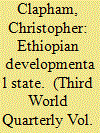

|
|
|
|
|
| Summary/Abstract |
Ethiopia provides one of the clearest examples of a ‘developmental state’ in Africa. Drawing on a deeply entrenched experience of statehood, the present Ethiopian regime has embarked on an ambitious programme, depending on the central capture of ‘rents’, to fund a massive expansion especially in communications, education, and hydroelectricity. High initial rates of growth have been achieved. However, the political setting is tightly constrained and the state has not allowed the private sector freedom of action to generate the required levels of production. Ultimate success will depend on the capacity to transform a state that has itself been central to the development process.
|
|
|
|
|
|
|
|
|
|
|
|
|
|
|
|
| 9 |
ID:
102718
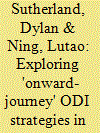

|
|
|
|
|
| Publication |
2011.
|
| Summary/Abstract |
Are the internationalization strategies of China's private businesses different from those of state-owned businesses? To date, little systematic empirical research addresses this question, despite the now well-established arguments that market and institutional imperfections influence the outward foreign direct investment (ODI) of China's state sector MNEs. Why is so little known about private sector foreign direct investment? One important reason is that private companies have gone to considerable lengths to conceal their activities by using offshore holding companies in tax havens. This paper, using a sample of offshore listed companies that are privately controlled, investigates what we dub 'onward-journeying' - foreign direct investment undertaken via tax havens. In doing so it further explores the ODI strategies of some of China's most successful private companies.
|
|
|
|
|
|
|
|
|
|
|
|
|
|
|
|
| 10 |
ID:
124767


|
|
|
|
|
| Publication |
2013.
|
| Summary/Abstract |
In this article, we propose a causal relationship between a region's communist revolutionary legacy before 1949 and the variation in private sector development after 1949. In the case of Zhejiang, the pre-1949 revolutionary experience led to the power struggle between two elite groups, the guerrilla cadre group and the southbound cadre group, in the province after 1949. As the weak side, guerrilla cadres were willing to protect local economic interests in exchange for local popular support, which improved their odds of political survival. As a result, in contrast with counties where the guerrilla forces were historically weak, counties with strong guerrilla forces before 1949 saw significantly more robust private sector development throughout much of the Mao and post-Mao periods. In this article we provide preliminary historical and statistical evidence to support this hypothesis.
|
|
|
|
|
|
|
|
|
|
|
|
|
|
|
|
| 11 |
ID:
096937


|
|
|
| 12 |
ID:
104614
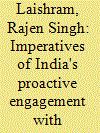

|
|
|
| 13 |
ID:
128677


|
|
|
| 14 |
ID:
149796
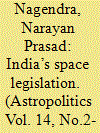

|
|
|
|
|
| Summary/Abstract |
India is a long-term investor in building up indigenous space infrastructure and facilities to develop rockets, satellites, and ground systems. However, the space sector is mainly government driven, with private industry participation limited to contributing to the missions executed by the Indian Space Research Organization. With the emergence of the New Space sector, there is a growing private space industry in India that needs to be supported by establishing legal aspects of space activities for private industry activities. This is important at both the international and national level, with the former needing consideration under the purview of the international treaty obligations of India and the latter for the development of the private industry ecosystem. In the present work, we explore some of the fundamental aspects of policies that need to be addressed in the process of forming national space legislation by the government of India. Recommendations in establishing a supportive ecosystem to encourage private space industry activity on a number of important issues are discussed herein.
|
|
|
|
|
|
|
|
|
|
|
|
|
|
|
|
| 15 |
ID:
145164


|
|
|
|
|
| Publication |
New Delhi, Pentagon Press (IDSA), 2016.
|
| Description |
xxi, 198p.: table, figureshbk
|
| Standard Number |
9788182749054
|
|
|
|
|
|
|
|
|
|
|
|
Copies: C:2/I:0,R:0,Q:0
Circulation
| Accession# | Call# | Current Location | Status | Policy | Location |
| 058667 | 338.47355054/BEH 058667 | Main | On Shelf | General | |
| 058668 | 338.47355054/BEH 058668 | Main | On Shelf | General | |
|
|
|
|
| 16 |
ID:
154644


|
|
|
| 17 |
ID:
100818
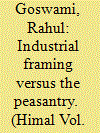

|
|
|
| 18 |
ID:
089622


|
|
|
|
|
| Publication |
2009.
|
| Summary/Abstract |
There is a public interest in ensuring that infrastructure systems are appropriately protected and prepared for disruptions. While infrastructure protection is usually viewed as a public responsibility, infrastructure risk management actually requires a high degree of cooperation between the public and private sectors, particularly in the sharing of information about risks to infrastructure. Discussions with Chief Security Officers across sectors of the US economy reveal the complexity of the task, as they describe at length the private sector's requirements of multiples types of information about a range of potential threats. While the US government has established many mechanisms for sharing information, barriers remain that inhibit both the private and public partners from obtaining the information needed to protect infrastructure. Overcoming these barriers requires new thinking about the intelligence generation process, the mechanisms and practices upon which the process relies, and the responsibilities of those in the private sector who participate in it.
|
|
|
|
|
|
|
|
|
|
|
|
|
|
|
|
| 19 |
ID:
143524


|
|
|
|
|
| Summary/Abstract |
Historically, the relationship between the private sector and international development has been deeply ambivalent. For many, a vibrant private sector and competitive markets are the essential prerequisites of development. For many others, development is principally concerned with ameliorating the dislocation associated with capitalist profit seeking. In the last generation, this ambivalence has given way to an emphasis on the complementarities between the private sector and development. Yet skeptics have continued to criticize the form of development this trend has promoted. We review the historical conditions behind this trend; the controversies concerning transnational corporations and foreign direct investment; the rise of corporate social responsibility; the parallel rise of philanthrocapitalism; and the growth of micro-credit as a market-oriented vehicle for poverty alleviation and empowerment. When taken together, it is clear that private sector actors have become increasingly influential in the new landscape of development, yet their effects remain ambiguous.
|
|
|
|
|
|
|
|
|
|
|
|
|
|
|
|
| 20 |
ID:
111300
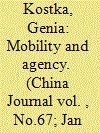

|
|
|